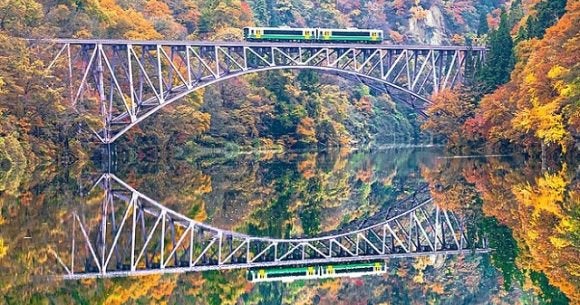
[Japanese public broadcaster issues apology for calling a train a “train”](https://soranews24.com/2022/09/11/japanese-public-broadcaster-issues-apology-for-calling-a-train-a-train/)
“The Japanese word that NHK used was densha, which might not seem it should cause any sort of commotion. If you’re studying Japanese, the first word your textbook is going to teach you for “train” is densha, and that’s also likely to be the first entry you’ll find for “train” in an English-to-Japanese dictionary. But while all densha are trains, not all trains are densha. Let’s take a look at the kanji characters densha is written with.
We’ll start with the second character. 車 is read as sha and originally means “cart,” but in modern contexts can also mean “car,” both in terms of an automobile and a train car, so there’s no problem there. The first kanji, though, 電/den, means “electricity,” and so the word densha refers specifically to a train that runs on electricity.
The problem, though, is that the train seen running on the Tadami Line in NHK’s video isn’t electric. It’s diesel, and so it’s not a densha, but a ressha, a word that can be used for trains of any type.”

6 comments
Is 汽車 no longer an acceptable term used to describe non-electrified trains?
wanna here something crazy, my first Japanese textbook had 汽車 in it as lesson vocabulary.
I believe it was written some time in the 70s.
“汽車の窓から手を握り…”
Ok I’m kind of an idiot. I always thought きしゃ was written 機車, used to mean any generic non-electrified train (steam or diesel). I had dictation write out きしゃ in my original post not even realizing it used those characters for that term. I guess I answered my own question.
But diesel trains are electric…
If you want to be pedantic, I’ve got some bad news for you: not all densha are ressha. In fact, not even all of what people call ressha here are in fact ressha.
For the same reason that not everything that runs on rails and which you are in the habit of calling a “train” is a train. A single unit can’t be a 列車, because there’s no 列.
meh….technically speaking….deisel trains are electric
deisel powers the electric generator which powers the electric motors. In english, to be pedantic, there is no “deisel train” there is only “diesel-electric train” In fact there are no internal combustion engine trains. There are steam, and there are electric. Anything that has an internal combustion engine is actually powering a generator which in turn powers the electric motors, so they are all electric trains except for steam engine trains.
so my opinion is that densha is equally correct. Though I understand the native japanese distinction between the types of trains might be different, it is a dogmatic or cultural difference rather than a technical difference.